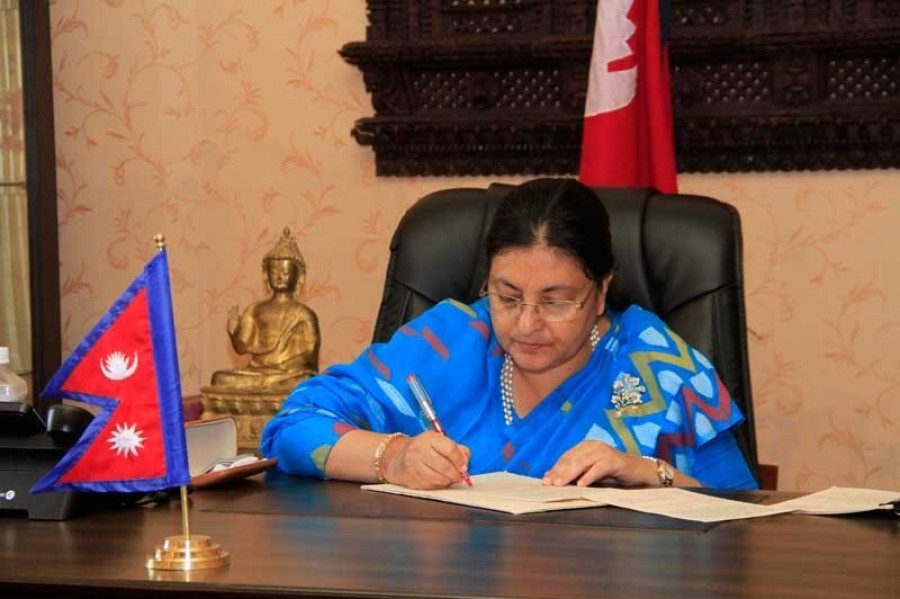Politics
President gives parties seven days to form government
As no party has a majority, any member of the House who has the backing of 138 members in the 275-strong Parliament gets appointed prime minister.
Binod Ghimire
At a time when the ruling alliance is yet to reach consensus on government formation, the President on Sunday asked political parties to form the government.
President Bidya Devi Bhandari has given the parties seven days to form a new government as per Article 76 (2) of the Constitution of Nepal. “As no party has a majority, the President has asked any member of the House of Representatives who can prove majority with the support of two or more parties to get appointed prime minister as per Article 76 (2),” said the President’s Office in a statement. Such a lawmaker should stake claim to government leadership by 5pm on December 25.
Article 76 (2) says the President appoints as prime minister a member of the House of Representatives who is able to command a majority with the support of two or more parties.
The new process for government formation will commence if no lawmaker can prove majority as per Article 76 (2).
“If the parties fail to make a claim as per Article 76 (2), the government leadership will go to the Nepali Congress as the largest party, as per Article 76 (3),” said Tika Dhakal, Communication expert to the President. Article 76 (3) says the parliamentary party leader of the party with the largest number of members in the House gets appointed prime minister if there is no possibility of forming a coalition or the prime minister of the coalition government fails to win the vote of confidence in the House within 30 days.
Although the constitution gives the President’s Office 35 days to complete the government formation process, the President did not wait to make the call. Sheetal Niwas officials said the sooner the government is formed the better. Article 76 (8) says the process of appointing prime minister under the Article should be completed within 35 days of the date of declaration of the final results of the election to the House of Representatives. The 35-day countdown began on Thursday, when the Commission submitted its report to the head of state.
The President made the call even before the parties had made any formal decision on government formation. Only on Saturday, CPN (Maoist Centre) chair Pushpa Kamal Dahal formally staked his claim to premiership before Congress chief and Prime Minister Sher Bahadur Deuba.
Dahal wants to become prime minister in the first half of the five-year term. The Maoist Centre has argued that as the party helped the Congress lead the government for more than a year and half, Congress should allow Dahal to head the new government for the first half of the term. However, during his meeting with Dahal, Deuba did not promise support to Dahal nor did he claim the post for himself.
Deuba, however, told Dahal that he would consider the matter after the Congress parliamentary party elections. As there are many aspirants for parliamentary party leader in the Congress, Deuba wants to start negotiations on government formation only after securing parliamentary party leadership. Deuba, himself, wants to head the new government in the first half of the five-year term.
Back in 2018, President Bhandari had called for government formation the very next day after she received the final election report from the commission. This time, the commission submitted its report to the President on Thursday, almost a month after the November 20 polls.
The government formation was possible soon after the commission’s report five years ago because the then left-alliance of the CPN-UML and the Maoist Centre was ready for it. But this time leaders of the ruling alliance, which is close to the halfway mark in the 275-strong lower house, are buying time until they get support of majority lawmakers.
As the homework for new government formation commences, some political leaders and constitutional lawyers have been claiming that government formation starts only after the lawmakers are administered the oath following the commencement of the new House session. “In parliamentary democracy, the parliament gives the government. So it is necessary for a prime ministerial candidate to be sworn in as a lawmaker first,” Ganesh Datta Bhatta, a former associate professor at Nepal Law Campus, told the Post.
“If the parties fail to make the claim as per the Article, the Congress as the largest party will get the leadership as per Article 76 (3),” said Dhakal. As per Article 76 (3) ), the parliamentary party leader of the party which has the highest number of members in the House gets appointed if there is no possibility for the coalition government or the prime minister of the coalition fails to win the vote of confidence within 30 days.
However, not everyone agrees. Bipin Adhikari, a former dean and professor at the Kathmandu University School of Law, said there is no need for the House to convene for government formation. “It is the responsibility of the President to commence the government formation process based on the election results,” he told the Post.
Sheetal Niwas has a similar view. “There are separate constitutional provisions for the government formation and commencement of the House session,” said Dhakal. “The House meeting will be summoned by the President on the recommendation of the incoming government.”




 13.12°C Kathmandu
13.12°C Kathmandu














